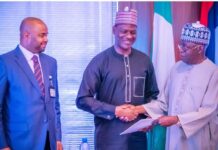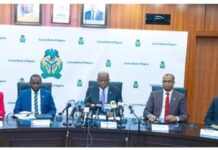
I would like to start by congratulating Lagos Traffic Radio for inaugurating these lecture series, but more importantly I congratulate Lagos Traffic Radio for staying alive.
The radio was born in 2012 as a public service information centre for commuters in Lagos to help them plan their journey with the aid of advance information about the traffic situation in the state.
The seed for the idea was sown many years before my foray into Government, whenever I travelled abroad and listened to dedicated traffic channels helping their citizens with Traffic information. Unfortunately, there was no corresponding response in the place l call home.
The tipping point was a visit to California where I observed that beyond information by radio, there was real time live images of traffic being broadcast on Television to residents of Los Angeles as early as 5 a.m to enable them plan their journey before leaving home.
If European and American cities invest in radio and television to gather information about traffic it must tell us many things, such as :-
a) Lagos is not alone; Los Angeles, Maryland, London, New York, Johannesburg, Cairo and Nairobi to mention a few have traffic challenges as a developmental responsibility to be managed by government and the private sector and I will come back to this.
b) Transportation and mobility, (like housing, waste management and crime), are the faces of rapid global urbanization that need to be effectively managed in order to deliver prosperity in the world’s mega cities and urban centres.
c) Intermodality, which is the ability to connect one form of transportation to another is one of the many options that cities are considering or implementing depending on their level of development.
But delivering the Lagos Traffic Radio is one half of the story. That happened on May 29th 2012 when I had the privilege to formally commission the station.
Keeping it alive, seven years after is another matter that deserves commendation. This is why I congratulated Lagos Traffic Radio for staying alive.
The commendations, for keeping the Radio and its vision alive must go to the staff and the presenters who by the quality of their work and programmes they present, have enriched our experience and interaction with Traffic Radio.
I speak of members of staff and programmes like:
“Your Side Mirror” on the morning belt 8:00 a.m-10:00 a.m by Victor Oteri, Tunmise Oladapo Kuku and Femi Akanni amongst others.
I speak of “LUNCH TIME WAKA” a pidgin based pogramme during the afternoon belt 12 noon – 2:00 p.m anchored by the duo of Mike Aroucha and Folashade Aderohunmu.
Of course during the Rush hour on the homeward journey there is “BON SENLOOO” in the evening belt ; a Yoruba based programme anchored by Adebowale Yussuf a.k.a Iya Shawama, Victoria Avoseh George and Deborah Obadofin amongst others.
To complement these programmes, there is also “AUTO MEDICS” where issues about vehicles and other related matters are resolved by Dr Kunle Sonaike and his team of auto experts.
To all of you I say, well done. I doff my hat.
I have highlighted the transport problems that we share with other cities and governments, but that is only one side of the coin.
The other side of the coin, is the side of opportunities, and these are plentiful in terms of investment, employment, businesses and the value chain in a transport network.
As I said, the key to intermodality is the connection of different forms of transportation.
In my time as governor, the key forms were road, rail and water; and much later aerial transport by a cable car project from Ijora to Apapa and Victoria Island which we supported by providing land and other administrative approvals.
But within the road, rail and water lay thousands of opportunities.
Road transport alone provided opportunities for employment in road construction, lane marking, vehicle supply, vehicle licensing, vehicle Inspection, management and repair, traffic signage, traffic lights , parking facilities and a lot more.
Rail transport, on the blue line, the construction of which we started and completed 4 stations and 7 kilometres from Mile 2 to National Theatre, provided thousands of jobs for construction workers.
The completion and operation of the line will yield more employment for train drivers, ticketing production and issuance, maintenance of coaches and trucks, signalling and communication to mention a few.
Water transportation participation and opportunities expanded in Lagos between 2007 and 2015.
We set up a statutory agency in that time called the Lagos State Waterways Authority (LASWA) to licence Ferry operators.
That in itself created employment for people who worked in the Authority and the operators they licensed.
We had completed the refurbishment of the Mile 2 Ferry terminal to link to the Blue line rail terminal, we had recovered critical unused ferry terminals from the Federal Government, refurbished them and put them to use. New ones like Ipakodo, Badore, Osborne were initiated from scratch and completed before I left office in 2015.
They were built with generous parking spaces for buses, Taxis and private cars to interlink them with road transport vehicles and commuters for inter modality.
There were already a growing number of companies that were licensed as ferry operators, and the state operated a less profitable route.
The ridership of commuters on Lagos waterways exploded from a few hundred thousand per month into millions as the operators increased.
Water transportation was providing employment for boat makers, boat operators, and manufacturers of safety equipment like life vests and also dredging companies who dredged the operational highway of the water vessels.The investment in communication support, like the Lagos Traffic Radio, was just another level of infrastructure to enrich the transportation ecosystem.
We also saw enormous opportunities and possibilities for other careers like transport planning, management, financing, education, and much more, which informed the establishment of the school of transport in the Lagos State University (LASU) in 2014.
Now that we have looked at the history of the Lagos Traffic Radio, the objectives of intermodal mobility, the opportunities that lie in the value chain of intermodal transport, perhaps the question to then ask is what next?
I will start to conclude this intervention by providing answers to that question by proposing recommendations to government and commuters about some things that can be done to take us closer to the vision of intermodal mobility.
Completion of the Rail: The first recommendation I will make is one that urges the prioritization of the completion of the light rail project. There are many lessons that will benefit us as we engage the 6 (six) other lines that will ultimately ensure rail connectivity for all divisions of Lagos.
There is already a coach that carries 1,200 passengers that was fully paid for since 2015 in the custody of manufacturers. This can form the basis of test running the existing 7 k.m track now that the state government has also returned to completing its own section of the Eric Moore – Badagry road and the Federal Government has taken action to complement the state work on the road.
I am mindful that the Federal Government is also committed to her own rail initiatives and that resources are scarce. Nevertheless, from Mumbai to Dubai to Washington DC, all the inter-city rail projects have massive if not total Federal Government support.
The Lagos intra-city Rail Project (and those of any other state) require and will benefit from some federal government muscle to see them to conclusion and operation.
Complete the Ferry Terminal; another recommendation is to urge the prioritization of the completion of the Ferry Terminals and urgent deployment to use.
In addition, this should be complemented by an open process for licensing ferry operators in the way buses and taxis are licensed to operate on roads.
In the spirit of federation, one of the laws that President Buhari recently refused to assent to was one that had the capacity to affect the power of states to license water transport vehicles and terminals.
Expand the BRT: Until the rail is completed and fully operational, the road network will be the biggest carrier in intermodal transport linkage. Therefore, urgent road repairs, patching and maintenance is recommended as a priority for government.
This will resuscitate the full operationalization of our asphalt/bitumen production facilities at Imota, Badagry and Ojodu/Isheri.
The spin-off of quarrying work to supply aggregates, Transportation and labour will be beneficial to the State in terms of employment.
The BRT (Bus Rapid Transit) scheme must be expanded not only by building other routes to other parts of the state, to complement Ikorodu and Lagos Island, the route franchising system started by LAGBUS in 2013 must be revisited and improved upon.
It provided operators with an opportunity to invest, buy their own buses, employ their own staff and operate Lagos routes under a public private partnership (PPP).
My final contribution is to make 2 more recommendations for consideration which I consider exceptional to the achievement of improved modality and transport efficiency.
The first is what I refuse to refer to as the central spine of Lagos Road traffic.
Although I have spoken about road repairs and patching, Government necessarily does not always have the resources to do everything at the same time.
Therefore, choices and priorities must be made to do more with less, and give the greatest good to the greatest number.
The patching and resurfacing of the central spine will give relief to many road commuters if made a priority.
The central spine is a cluster of Roads that carry the heaviest traffic such as :-
Lagos Badagry, 3rd Mainland, Apapa – Oshodi – Oworonsoki all of which are currently under one type of construction or repair or maintenance by the Federal Government.
It also includes Lekki Epe Expressway, Ikorodu-Mile 12 – Funsho Williams (Already ceded to Lagos State) , Agege Motor Road – Ipaja.
The first two of this are under management of the state government, while Agege Motor Road like Badagry express way is jointly managed by State and Federal in sections.
In addition to maintenance, LASTMA officers must be encouraged to work longer shifts up to 10 p.m on these Routes and paid for overtime as was done before.
Transport Education:
The second and final point is Traffic Education.
I see a lot of motorists driving on our roads who do not know the difference between the fast and the slow lane.
Majorly, articulated and other big trucks traditionally drive on the fast lane but they are not fast vehicles and should not be there.
This is a cause of traffic slow down and invariably congestion.
Also lane discipline is manifestly absent and we see vehicles driving right in the middle of the road and one vehicle occupying lanes meant for two vehicles.
This also slows down movement and causes congestion.
Knowledge of and obedience of traffic signs and traffic lights is yet another area of urgent need.
The Lagos traffic radio can help by initiating new programmes that will help to educate the public about the DOs and DONTs on our motorways.
This can be complemented with quiz competitions and sponsorship by major brands where the participants can win token prizes for correct answers in order to stimulate public interest.
The brand sponsors can fund this as corporate social responsibility and possibly claim tax relief.
The Government in my view must challenge the State Ministry of Education (in collaboration with the Ministry of Transportation) to introduce traffic education into the school curriculum drawn from the Highway Code and the Traffic Law , for primary, secondary and tertiary Schools.
If this is properly implemented, I am optimistic that within a Decade or less, we would have produced a new generation of Lagos Motorists who are more educated and aware of their rights and duties on our motorways.
These are my thoughts about intermodal mobility for Lagos, today and tomorrow.
Babatunde Raji Fashola, SAN






